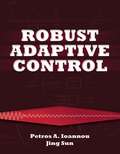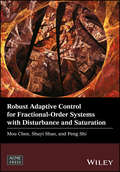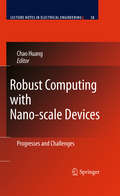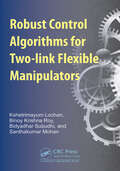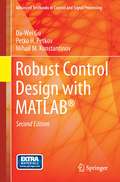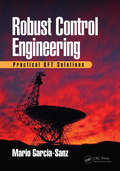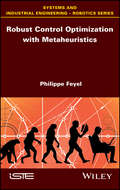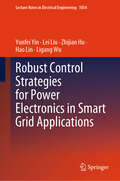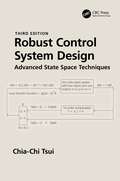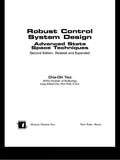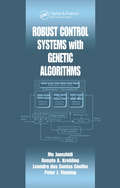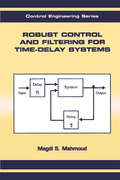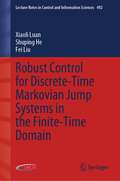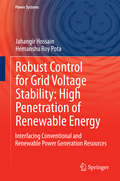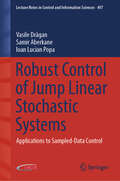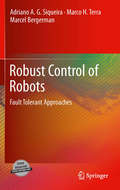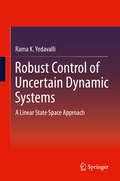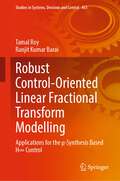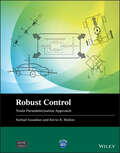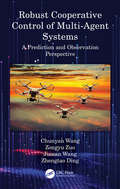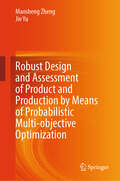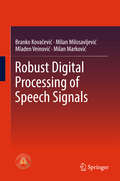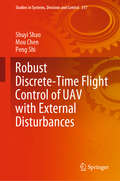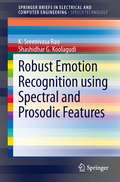- Table View
- List View
Robust Adaptive Control (Dover Books On Electrical Engineering Ser.)
by Jing Sun Petros IoannouThis tutorial-style presentation of the fundamental techniques and algorithms in adaptive control is designed to meet the needs of a wide audience without sacrificing mathematical depth or rigor. The text explores the design, analysis, and application of a wide variety of algorithms that can be used to manage dynamical systems with unknown parameters. Topics include models for dynamic systems, stability, online parameter estimation, parameter identifiers, model reference adaptive control, adaptive pole placement control, and robust adaptive laws.Engineers and students interested in learning how to design, stimulate, and implement parameter estimators and adaptive control schemes will find that this treatment does not require a full understanding of the analytical and technical proofs. This volume will also serve graduate students who wish to examine the analysis of simple schemes and discover the steps involved in more complex proofs. Advanced students and researchers will find it a guide to the grasp of long and technical proofs. Numerous examples demonstrating design procedures and the techniques of basic analysis enrich the text.
Robust Adaptive Control for Fractional-Order Systems with Disturbance and Saturation
by Peng Shi Mou Chen Shuyi ShaoA treatise on investigating tracking control and synchronization control of fractional-order nonlinear systems with system uncertainties, external disturbance, and input saturation Robust Adaptive Control for Fractional-Order Systems, with Disturbance and Saturation provides the reader with a good understanding on how to achieve tracking control and synchronization control of fractional-order nonlinear systems with system uncertainties, external disturbance, and input saturation. Although some texts have touched upon control of fractional-order systems, the issues of input saturation and disturbances have rarely been considered together. This book offers chapter coverage of fractional calculus and fractional-order systems; fractional-order PID controller and fractional-order disturbance observer; design of fractional-order controllers for nonlinear chaotic systems and some applications; sliding mode control for fractional-order nonlinear systems based on disturbance observer; disturbance observer based neural control for an uncertain fractional-order rotational mechanical system; adaptive neural tracking control for uncertain fractional-order chaotic systems subject to input saturation and disturbance; stabilization control of continuous-time fractional positive systems based on disturbance observer; sliding mode synchronization control for fractional-order chaotic systems with disturbance; and more. Based on the approximation ability of the neural network (NN), the adaptive neural control schemes are reported for uncertain fractional-order nonlinear systems Covers the disturbance estimation techniques that have been developed to alleviate the restriction faced by traditional feedforward control and reject the effect of external disturbances for uncertain fractional-order nonlinear systems By combining the NN with the disturbance observer, the disturbance observer based adaptive neural control schemes have been studied for uncertain fractional-order nonlinear systems with unknown disturbances Considers, together, the issue of input saturation and the disturbance for the control of fractional-order nonlinear systems in the present of system uncertainty, external disturbance, and input saturation Robust Adaptive Control for Fractional-Order Systems, with Disturbance and Saturation can be used as a reference for the academic research on fractional-order nonlinear systems or used in Ph.D. study of control theory and engineering.
Robust Computing with Nano-scale Devices
by Chao HuangRobust Nano-Computing focuses on various issues of robust nano-computing, defect-tolerance design for nano-technology at different design abstraction levels. It addresses both redundancy- and configuration-based methods as well as fault detecting techniques through the development of accurate computation models and tools. The contents present an insightful view of the ongoing researches on nano-electronic devices, circuits, architectures, and design methods, as well as provide promising directions for future research.
Robust Control Algorithms for Flexible Manipulators
by Santhakumar Mohan Bidyadhar Subudhi Kshetrimayum Lochan Binoy Krishna RoyVarious modelling and control of two-link flexible manipulators are presented in this book. The lumped parameter modelling method and the assumed modes method modelling are comprehensively reviewed. The book also reviews the trajectory tracking problem and tip trajectory tracking problem along with the suppression of tip deflection of the links. An exponential time varying signal and a chaotic signal are considered as the desired trajectories. The identical/ non-identical slave manipulator is synchronised with the controlled master manipulator so that the slave manipulator indirectly follows the desired manipulator.
Robust Control Design with MATLAB®
by Da-Wei Gu Mihail M Konstantinov Petko H. PetkovRobust Control Design with MATLAB® (second edition) helps the student to learn how to use well-developed advanced robust control design methods in practical cases. To this end, several realistic control design examples from teaching-laboratory experiments, such as a two-wheeled, self-balancing robot, to complex systems like a flexible-link manipulator are given detailed presentation. All of these exercises are conducted using MATLAB® Robust Control Toolbox 3, Control System Toolbox and Simulink®. By sharing their experiences in industrial cases with minimum recourse to complicated theories and formulae, the authors convey essential ideas and useful insights into robust industrial control systems design using major H-infinity optimization and related methods allowing readers quickly to move on with their own challenges. The hands-on tutorial style of this text rests on an abundance of examples and features for the second edition: * rewritten and simplified presentation of theoretical and methodological material including original coverage of linear matrix inequalities; * new Part II forming a tutorial on Robust Control Toolbox 3; * fresh design problems including the control of a two-rotor dynamic system; and * end-of-chapter exercises. Electronic supplements to the written text that can be downloaded from extras.springer.com/isbn include: * M-files developed with MATLAB® help in understanding the essence of robust control system design portrayed in text-based examples; * MDL-files for simulation of open- and closed-loop systems in Simulink®; and * a solutions manual available free of charge to those adopting Robust Control Design with MATLAB® as a textbook for courses. Robust Control Design with MATLAB® is for graduate students and practising engineers who want to learn how to deal with robust control design problems without spending a lot of time in researching complex theoretical developments.
Robust Control Engineering: Practical QFT Solutions
by Mario Garcia-SanzThis book thoroughly covers the fundamentals of the QFT robust control, as well as practical control solutions, for unstable, time-delay, non-minimum phase or distributed parameter systems, plants with large model uncertainty, high-performance specifications, nonlinear components, multi-input multi-output characteristics or asymmetric topologies. The reader will discover practical applications through a collection of fifty successful, real world case studies and projects, in which the author has been involved during the last twenty-five years, including commercial wind turbines, wastewater treatment plants, power systems, satellites with flexible appendages, spacecraft, large radio telescopes, and industrial manufacturing systems. Furthermore, the book presents problems and projects with the popular QFT Control Toolbox (QFTCT) for MATLAB, which was developed by the author.
Robust Control Optimization with Metaheuristics
by Philippe FeyelIn the industrial framework, a Control Engineer must design a unique control law that is then tested and validated on a single prototype with a level of reliability high enough to to meet a number of complex specifications on various systems. In order to do this, the Engineer uses an experimental iterative process (Trial and Error phase) which relies heavily on his or her experience. This book looks to optimise the methods for synthesising servo controllers by making them more direct and thus quicker to design. This is achieved by calculating a final controller to directly tackle the high-end system specs.
Robust Control Strategies for Power Electronics in Smart Grid Applications (Lecture Notes in Electrical Engineering #1034)
by Ligang Wu Lei Liu Yunfei Yin Hao Lin Zhijian HuNavigating the forefront of smart grid technology, the book, "Robust Control Strategies for Power Electronics in Smart Grid Applications," delves into innovative approaches, offering a fresh perspective on how to address the dynamic challenges in this field. With a focus on robust control strategies, the book provides a comprehensive exploration of diverse power converter configurations, presenting novel solutions for achieving optimal efficiency and performance in smart grid applications.
Robust Control System Design: Advanced State Space Techniques
by Chia-Chi TsuiThis book presents a synthesized design principle versus the existing separation principle of modern control theory of over six decades since the start. Guided by this new principle, a generalized state feedback control can be designed based on the parameters of observer and for a great majority of plant systems, and the robust property of this control can be fully realized. The robust property of the existing state feedback control which is designed separate from the parameters of its realizing observer, cannot be realized for a great majority of plant systems. By freely design and adjust the observer order, the corresponding generalized state feedback control can unify completely the existing state feedback control and static output feedback control, and can adjust effectively the tradeoff between performance and robustness. This generalized state feedback control can assign eigen-structure, and can improve performance and robustness far more effectively than the control designed using classical control theory. Equally significant, the results of this book are very simple that can be comprehended and grasped very easily. These results are introduced and illustrated from the basic level, and use only the basic mathematical tools. Ample examples and exercise problems that can be solved by hand computation, are provided. This third edition made substantial improvement on this aspect. Modern control theoreticians only formulated the feedback control design problem in various ways, the point however is to really solve this problem.
Robust Control System Design: Advanced State Space Techniques (Control Engineering Ser. #Vol. 16)
by Chia-Chi TsuiRobust Control System Design: Advanced State Space Techniques, Second Edition expands upon a groundbreaking and combinatorial approach to state space control system design that fully realizes the critical loop transfer function and robustness properties of state/generalized state feedback control. This edition offers many new examples and exercises
Robust Control Systems with Genetic Algorithms
by Mo Jamshidi Renato A. Krohling Leandro dos S. Coelho Peter J. FlemingIn recent years, new paradigms have emerged to replace-or augment-the traditional, mathematically based approaches to optimization. The most powerful of these are genetic algorithms (GA), inspired by natural selection, and genetic programming, an extension of GAs based on the optimization of symbolic codes.Robust Control Systems with Genetic Algorithms builds a bridge between genetic algorithms and the design of robust control systems. After laying a foundation in the basics of GAs and genetic programming, it demonstrates the power of these new tools for developing optimal robust controllers for linear control systems, optimal disturbance rejection controllers, and predictive and variable structure control. It also explores the application of hybrid approaches: how to enhance genetic algorithms and programming with fuzzy logic to design intelligent control systems. The authors consider a variety of applications, such as the optimal control of robotic manipulators, flexible links and jet engines, and illustrate a multi-objective, genetic algorithm approach to the design of robust controllers with a gasification plant case study.The authors are all masters in the field and clearly show the effectiveness of GA techniques. Their presentation is your first opportunity to fully explore this cutting-edge approach to robust optimal control system design and exploit its methods for your own applications.
Robust Control and Filtering for Time-Delay Systems
by Magdi S. MahmoudA discussion of robust control and filtering for time-delay systems. It provides information on approaches to stability, stabilization, control design, and filtering aspects of electronic and computer systems - explicating the developments in time-delay systems and uncertain time-delay systems. There are appendices detailing important facets of matrix theory, standard lemmas and mathematical results, and applications of industry-tested software.
Robust Control for Discrete-Time Markovian Jump Systems in the Finite-Time Domain (Lecture Notes in Control and Information Sciences #492)
by Fei Liu Shuping He Xiaoli LuanThis book provides robust analysis and synthesis tools for Markovian jump systems in the finite-time domain with specified performances. It explores how these tools can make the systems more applicable to fields such as economic systems, ecological systems and solar thermal central receivers, by limiting system trajectories in the desired bound in a given time interval.Robust Control for Discrete-Time Markovian Jump Systems in the Finite-Time Domain focuses on multiple aspects of finite-time stability and control, including: finite-time H-infinity control;finite-time sliding mode control;finite-time multi-frequency control;finite-time model predictive control; andhigh-order moment finite-time control for multi-mode systems and also provides many methods and algorithms to solve problems related to Markovian jump systems with simulation examples that illustrate the design procedure and confirm the results of the methods proposed.The thorough discussion of these topics makes the book a useful guide for researchers, industrial engineers and graduate students alike, enabling them systematically to establish the modeling, analysis and synthesis for Markovian jump systems in the finite-time domain.
Robust Control for Grid Voltage Stability: High Penetration of Renewable Energy
by Jahangir Hossain Hemanshu Roy PotaThis book makes the area of integration of renewable energy into the existing electricity grid accessible to engineers and researchers. This is a self-contained text which has models of power system devices and control theory necessary to understand and tune controllers in use currently. The new research in renewable energy integration is put into perspective by comparing the change in the system dynamics as compared to the traditional electricity grid. The emergence of the voltage stability problem is motivated by extensive examples. Various methods to mitigate this problem are discussed bringing out their merits clearly. As a solution to the voltage stability problem, the book covers the use of FACTS devices and basic control methods. An important contribution of this book is to introduce advanced control methods for voltage stability. It covers the application of output feedback methods with a special emphasis on how to bound modelling uncertainties and the use of robust control theory to design controllers for practical power systems. Special emphasis is given to designing controllers for FACTS devices to improve low-voltage ride-through capability of induction generators. As generally PV is connected in low voltage distribution area, this book also provides a systematic control design for the PV unit in distribution systems. The theory is amply illustrated with large IEEE Test systems with multiple generators and dynamic load. Controllers are designed using Matlab and tested using full system models in PSSE.
Robust Control of Jump Linear Stochastic Systems: Applications to Sampled-Data Control (Lecture Notes in Control and Information Sciences #497)
by Vasile Drăgan Samir Aberkane Ioan Lucian PopaThis monograph concentrates on the theory of robust control of linear impulsive stochastic systems and stochastic systems with jumps. It discusses theoretical points concerned with impulsive stochastic systems including optimal control, robust stabilization, and H2- and Hinfinity-type results. Considering the major role played by the impulsive Lyapunov and impulsive Riccati equations in these problems, the book presents a thorough treatment of these equations in a general framework. It also presents various applications to sampled-data control. Robust Control of Jump Linear Stochastic Systems is a self-contained and clearly structured presentation of up-to-date research in this area, relevant to researchers in control theory and to non-specialists who are interested in the theory of robust control of linear impulsive stochastic systems. Theoretical and applied mathematicians, research engineers, and graduate students in the aforementioned fields will also find value in this book.
Robust Control of Robots
by Marco H. Terra Marcel Bergerman Adriano A. SiqueiraRobust Control of Robots bridges the gap between robust control theory and applications, with a special focus on robotic manipulators. It is divided into three parts: robust control of regular, fully-actuated robotic manipulators;robust post-failure control of robotic manipulators; androbust control of cooperative robotic manipulators.In each chapter the mathematical concepts are illustrated with experimental results obtained with a two-manipulator system. They are presented in enough detail to allow readers to implement the concepts in their own systems, or in Control Environment for Robots, a MATLAB®-based simulation program freely available from the authors. The target audience for Robust Control of Robots includes researchers, practicing engineers, and graduate students interested in implementing robust and fault tolerant control methodologies to robotic manipulators.
Robust Control of Uncertain Dynamic Systems
by Rama K. YedavalliThis textbook aims to provide a clear understanding of the various tools of analysis and design for robust stability and performance of uncertain dynamic systems. In model-based control design and analysis, mathematical models can never completely represent the "real world" system that is being modeled, and thus it is imperative to incorporate and accommodate a level of uncertainty into the models. This book directly addresses these issues from a deterministic uncertainty viewpoint and focuses on the interval parameter characterization of uncertain systems. Various tools of analysis and design are presented in a consolidated manner. This volume fills a current gap in published works by explicitly addressing the subject of control of dynamic systems from linear state space framework, namely using a time-domain, matrix-theory based approach. This book also: Presents and formulates the robustness problem in a linear state space model framework. Illustrates various systems level methodologies with examples and applications drawn from aerospace, electrical and mechanical engineering. Provides connections between lyapunov-based matrix approach and the transfer function based polynomial approaches. Robust Control of Uncertain Dynamic Systems: A Linear State Space Approach is an ideal book for first year graduate students taking a course in robust control in aerospace, mechanical, or electrical engineering.
Robust Control-Oriented Linear Fractional Transform Modelling: Applications for the µ-Synthesis Based H∞ Control (Studies in Systems, Decision and Control #453)
by Ranjit Kumar Barai Tamal RoyThis book covers a new paradigm of system modeling – the robust control-oriented linear fractional transformation (LFT) modeling. A dynamic system expressed in LFT modeling framework paves the way for the application of modern robust controller design technique like μ-synthesis method for controller design. This book covers the generalized robust control-oriented LFT modeling representation of the MIMO system depending upon the uncertainty structure, system dynamics, and the dimensions of the input–output. The modeling framework results into a compact and manageable representation of uncertainty modeling in the form of feedback-like structure that is suitable for design and implementation of the robust control technique like μ-synthesis-based H∞ control theory. This book also describes the application of the proposed methodology in a variety of advanced mechatronic systems like the Twin Rotor MIMO system, wheeled mobile robot, and an industrial robot arm.
Robust Control: Youla Parameterization Approach (Wiley-ASME Press Series)
by Farhad Assadian Kevin R. MallonRobust Control Robust Control Youla Parameterization Approach Discover efficient methods for designing robust control systems In Robust Control: Youla Parameterization Approach, accomplished engineers Dr. Farhad Assadian and Kevin R. Mallon deliver an insightful treatment of robust control system design that does not require a theoretical background in controls. The authors connect classical control theory to modern control concepts using the Youla method and offer practical examples from the automotive industry for designing control systems with the Youla method. The book demonstrates that feedback control can be elegantly designed in the frequency domain using the Youla parameterization approach. It offers deep insights into the many practical applications from utilizing this technique in both Single Input Single Output (SISO) and Multiple Input Multiple Output (MIMO) design. Finally, the book provides an estimation technique using Youla parameterization and controller output observer for the first time. Robust Control offers readers: A thorough introduction to a review of the Laplace Transform, including singularity functions and transfer functions Comprehensive explorations of the response of linear, time-invariant, and dynamic systems, as well as feedback principles and feedback design for SISO Practical discussions of norms and feedback systems, feedback design by the optimization of closed-loop norms, and estimation design for SISO using the parameterization approach In-depth examinations of MIMO control and multivariable transfer function properties Perfect for industrial researchers and engineers working with control systems, Robust Control: Youla Parameterization Approach is also an indispensable resource for graduate students in mechanical, aerospace, electrical, and chemical engineering.
Robust Cooperative Control of Multi-Agent Systems: A Prediction and Observation Prospective
by Chunyan Wang Zongyu Zuo Jianan Wang Zhengtao DingThis book presents a concise introduction to the latest advances in robust cooperative control design for multi-agent systems with input delay and external disturbances, especially from a prediction and observation perspective. The volume covers a wide range of applications, such as the trajectory tracking of quadrotors, formation flying of multiple unmanned aerial vehicles (UAVs) and fixed-time formation of ground vehicles. Robust cooperative control means that multi-agent systems are able to achieve specified control tasks while remaining robust in the face of both parametric and nonparametric model uncertainties. In addition, the authors cover a wide range of key issues in cooperative control, such as communication and input delays, parametric model uncertainties and external disturbances. Moving beyond the scope of existing works, a systematic prediction and observation approach to designing robust cooperative control laws is presented. About the Authors Chunyan Wang is an Associate Professor in the School of Aerospace Engineering at Beijing Institute of Technology, China.Zongyu Zuo is a full Professor with the School of Automation Science and Electrical Engineering, Beihang University, China.Jianan Wang is an Associate Professor in the School of Aerospace Engineering at Beijing Institute of Technology, China.Zhengtao Ding is a Professor in the Department of Electrical and Electronic Engineering at University of Manchester, U.K.
Robust Design and Assessment of Product and Production by Means of Probabilistic Multi-objective Optimization
by Jie Yu Maosheng ZhengThis book develops robust design and assessment of product and production from viewpoint of system theory, which is quantized with the introduction of brand new concept of preferable probability and its assessment. It aims to provide a new idea and novel way to robust design and assessment of product and production and relevant problems. Robust design and assessment of product and production is attractive to both customer and producer since the stability and insensitivity of a product’s quality to uncontrollable factors reflect its value. Taguchi method has been used to conduct robust design and assessment of product and production for half a century, but its rationality is criticized by statisticians due to its casting of both mean value of a response and its dispersion into one index, which doesn’t characterize the issue of simultaneous optimization of above two independent sub-responses sufficiently for robust design, so an appropriate approach is needed. The preference or role of a response in the evaluation is indicated by using preferable probability as the unique index. Thus, the rational approach for robust design and assessment of product and production is formulated by means of probabilistic multi-objective optimization, which reveals the simultaneous optimization of both mean value of a response and its dispersion in manner of joint probability. Besides, defuzzification and fuzzification measurements are involved as preliminary approaches for robust assessment, the latter provides miraculous treatment for the 'target the best' case flexibly.
Robust Design of Digital Circuits on Foil
by Wim Dehaene Kris Myny Jan GenoeCovering both TFT technologies, and the theory and practice of circuit design, this book equips engineers with the technical knowledge and hands-on skills needed to make circuits on foil with organic or metal oxide based TFTs for applications such as flexible displays and RFID. It provides readers with a solid theoretical background and gives an overview of current TFT technologies including device architecture, typical parameters, and a theoretical framework for comparing different logical families. Concrete, real-world design cases, such as RFID circuits, and organic and metal oxide TFT-based 8-bit microprocessors, enable readers to grasp the practical potential of these design techniques and how they can be applied. This is an essential guide for students and professionals who need to make better transistors on foil.
Robust Digital Processing of Speech Signals
by Milan Milosavljević Branko Kovačević Mladen Veinović Milan MarkovićThis book focuses on speech signal phenomena, presenting a robustification of the usual speech generation models with regard to the presumed types of excitation signals, which is equivalent to the introduction of a class of nonlinear models and the corresponding criterion functions for parameter estimation. Compared to the general class of nonlinear models, such as various neural networks, these models possess good properties of controlled complexity, the option of working in "online" mode, as well as a low information volume for efficient speech encoding and transmission. Providing comprehensive insights, the book is based on the authors' research, which has already been published, supplemented by additional texts discussing general considerations of speech modeling, linear predictive analysis and robust parameter estimation.
Robust Discrete-Time Flight Control of UAV with External Disturbances (Studies in Systems, Decision and Control #317)
by Peng Shi Mou Chen Shuyi ShaoThis book studies selected discrete-time flight control schemes for fixed-wing unmanned aerial vehicle (UAV) systems in the presence of system uncertainties, external disturbances and input saturation. The main contributions of this book for UAV systems are as follows: (i) the proposed integer-order discrete-time control schemes are based on the designed discrete-time disturbance observers (DTDOs) and the neural network (NN); and (ii) the fractional-order discrete-time control schemes are developed by using the fractional-order calculus theory, the NN and the DTDOs. The book offers readers a good understanding of how to establish discrete-time tracking control schemes for fixed-wing UAV systems subject to system uncertainties, external wind disturbances and input saturation. It represents a valuable reference guide for academic research on uncertain UAV systems, and can also support advanced / Ph.D. studies on control theory and engineering.
Robust Emotion Recognition using Spectral and Prosodic Features
by K. Sreenivasa Rao Shashidhar G. KoolagudiIn this brief, the authors discuss recently explored spectral (sub-segmental and pitch synchronous) and prosodic (global and local features at word and syllable levels in different parts of the utterance) features for discerning emotions in a robust manner. The authors also delve into the complementary evidences obtained from excitation source, vocal tract system and prosodic features for the purpose of enhancing emotion recognition performance. Features based on speaking rate characteristics are explored with the help of multi-stage and hybrid models for further improving emotion recognition performance. Proposed spectral and prosodic features are evaluated on real life emotional speech corpus.
